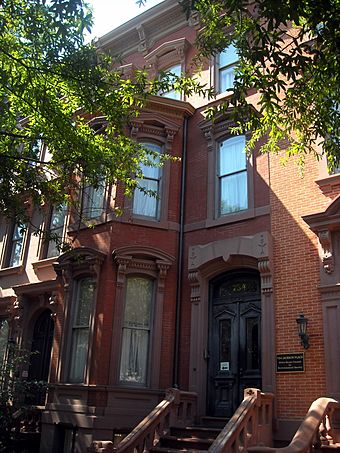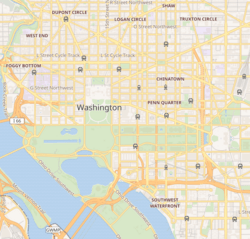American Peace Society house facts for kids
|
American Peace Society
|
|
|
U.S. National Historic Landmark District
Contributing Property |
|
 |
|
| Location | 734 Jackson Pl., NW., Washington, D.C. |
|---|---|
| Built | 1878 |
| Architectural style | Italianate |
| Part of | Lafayette Square Historic District (ID70000833) |
| NRHP reference No. | 74002155 |
Quick facts for kids Significant dates |
|
| Added to NRHP | September 13, 1974 |
| Designated NHL | May 30, 1974 |
| Designated NHLDCP | August 29, 1970 |
The American Peace Society House, also known as the Glover House, is a historic building in Washington, D.C.. It is located at 734 Jackson Place NW, right across from Lafayette Square.
This house was built in 1878 for Charles Carroll Glover. He was a well-known banker and a person who gave money to good causes. The house is famous because it was the main office for the American Peace Society from 1911 to 1948. This group was one of the first in the United States to openly support pacifism. Pacifism means believing that all wars are wrong and that disagreements should be solved peacefully. The American Peace Society House was named a National Historic Landmark in 1974.
What is the American Peace Society House?
The American Peace Society House is on the west side of Jackson Place. This street runs along the west side of Lafayette Square. It is one of several similar houses built close together, called row houses. The house is made of brick with stone decorations.
How the House Looks
The building has three floors. The front of the house has two main sections. The entrance is on the right side. The left side has a part that sticks out, shaped like a polygon, and goes up two stories. The windows have decorative frames above them. These frames are curved on the first floor and pointed on the upper floors. The main door is also under a curved, decorated opening with columns on each side.
A Home for Peace
The house was built in 1878. Its first important owner was Charles Carroll Glover. He was a very important banker and helped many charities in Washington. For a short time in 1902, the War College Board used the house.
From 1911 to 1947, the house became the headquarters for the American Peace Society. This society has a long history. It started from many smaller peace groups in the early 1800s. The oldest of these, the New York Peace Society, began in 1815. In 1828, these different groups joined together. They formed the first organization in the United States dedicated to promoting peace around the world.
In the 1970s, the house was used by the American Revolution Bicentennial Commission. By then, it had been connected to a neighboring house. Today, the row houses, including this one, are owned by the United States government. The General Services Administration manages them.
 | Audre Lorde |
 | John Berry Meachum |
 | Ferdinand Lee Barnett |




